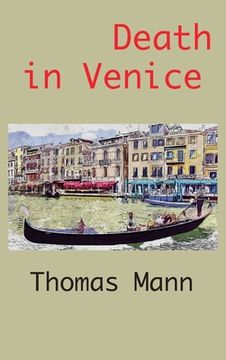Compartir
Death in Venice (en Inglés)
Thomas Mann
(Autor)
·
Kenneth Burke
(Traducido por)
·
Ancient Wisdom Publications
· Tapa Dura
Death in Venice (en Inglés) - Mann, Thomas ; Burke, Kenneth
27,68 €
29,13 €
Ahorras: 1,46 €
Elige la lista en la que quieres agregar tu producto o crea una nueva lista
✓ Producto agregado correctamente a la lista de deseos.
Ir a Mis Listas
Origen: Estados Unidos
(Costos de importación incluídos en el precio)
Se enviará desde nuestra bodega entre el
Jueves 27 de Junio y el
Martes 16 de Julio.
Lo recibirás en cualquier lugar de España entre 1 y 5 días hábiles luego del envío.
Reseña del libro "Death in Venice (en Inglés)"
Mann's original intention was to write about "passion as confusion and degradation" after having been fascinated by the true story of Goethe's love for 18-year-old Baroness Ulrike von Levetzow, which had led Goethe to write his "Marienbad Elegy". The May 1911 death of composer Gustav Mahler in Vienna and Mann's interest in the boy Wladzio during summer 1911 vacation in Venice were additional experiences occupying his thoughts. He used the story to illuminate certain convictions about the relationship between life and mind, with Aschenbach representing the intellect. Mann also was influenced by Sigmund Freud and his views on dreams as well as by philosopher Friedrich Nietzsche who had visited Venice several times.The novella is rife with allusions from antiquity forward, especially to Greek antiquity and to German works (literary, art-historical, musical, visual) from the 18th century.The novella is intertextual, with the chief sources being first the connection of erotic love to philosophical wisdom traced in Plato's Symposium and Phaedrus, and second the Nietzschean contrast between Apollo, the god of restraint and shaping form, and Dionysus, the god of excess and passion. The trope of placing classical deities in contemporary settings was popular at the time when Mann was writing Death in Venice.Aschenbach's name and character may be inspired by the homosexual German poet August von Platen-Hallermünde. There are allusions to his poems about Venice in the novella, and like Aschenbach, he died of cholera on an Italian island. Aschenbach's first name is almost an anagram of August, and the character's last name may be derived from Ansbach, Platen's birthplace. However, the name has another clear significance: Aschenbach literally means "ash brook".
- 0% (0)
- 0% (0)
- 0% (0)
- 0% (0)
- 0% (0)
Todos los libros de nuestro catálogo son Originales.
El libro está escrito en Inglés.
La encuadernación de esta edición es Tapa Dura.
✓ Producto agregado correctamente al carro, Ir a Pagar.

